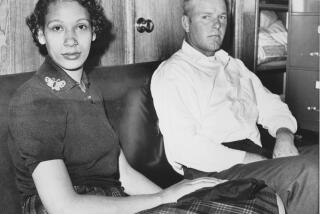Book review: ‘Is Marriage for White People?’
- Share via
The provocative title of Ralph Richard Banks’ new book — “Is Marriage for White People?” — will undoubtedly prompt a wide range of reactions. But even though Banks examines the state of matrimony for all Americans, a primary focus of his work is the decline of marriage among African Americans (“the most unmarried people in our nation”), and it is black women who have commanded much of his attention.
“Nearly seven out of every ten black women are unmarried, and as many as three out of ten may never marry,” Banks writes. “For black women, being unmarried has become the new normal.”
There’s an assumption here that marriage can benefit the participants, and Banks’ concluding prescription for the single black female is concise: Be willing to marry outside the race.
Sounds simple. Perhaps obvious. But it’s the first 180 pages of the book — the journey — that make “Marriage” a must-read for anyone who has an interest in understanding race relations in the United States. Banks, a Stanford law professor (and brother of Times columnist Sandy Banks), has assembled a series of anecdotes, histories, studies and psychologies to explain a phenomenon that is intimately understood by black women and should be understood by the rest of us.
To start, Banks reminds us that the institution of marriage has been transformed — for everyone — in the last several decades, evolving from a social contract designed to ensure economic stability (or enhancement) and procreation to something that is more relationship-based. We increasingly marry for personal fulfillment and often hope to achieve some financial stability before we wed.
Many black women have achieved that financial stability, “but they find it difficult to establish the intimate relationships that they want, the type of relationships that women of all races want,” Banks says. Yet interracial marriage is rarely an option. Indeed, black women “lead the most racially segregated intimate lives of any Americans.”
There is, to quote a chapter title in Banks’ book, a “man shortage,” and the list of reasons why that shortage exists may sound familiar. Banks points to the greater willingness of African American men to marry outside their race. In addition, he cites the incarceration of black men, and he discusses disparities in education and income between African American women and men. Black women “vastly” outnumber black men in college — and outperform them on campus. “During the past three decades, the earnings of black female college graduates have increased more than four times as much as the earnings of their black male counterparts.”
What that means for most professional black women, Banks writes, is that they will stay single or marry someone less accomplished.
Much in our culture affirms the phenomenon. Banks points to the “blue collar brother” of several Tyler Perry movies. “The message is that professional black women should abandon their highfalutin ways and go for the guy driving the bus or reading the meter.”
Last year, “Nightline” aired a segment on unmarried black women during which bestselling author and comedian Steve Harvey suggested that accomplished professionals should not overlook lower-achieving black men. Essence magazine has offered similar advice: “Feeling embarrassed by your spouse occasionally is a trifle to pay for true love.”
Pop culture’s message to black women is clear, Banks says. Not married? It’s their own damn fault. Remember, there are a lot of good men out there who can be lifted up by the love of a woman.
With all that baggage, why wouldn’t a well-educated, professional black woman be ready to marry outside her race?
The reasons, Banks says, are numerous and complex, wrapped up in centuries of history, stereotypes and tradition.
He points to:
•Black women who fear marrying outside their race would betray their fathers and grandfathers.
•Black women who fear that a white man’s family won’t be accepting, or fear that their families won’t accept a white male. “In my interviews with black folks throughout the country, I again and again confronted this unmistakable marker of continuing racial division: Many black parents don’t want their child to marry a white person because they don’t like white people.” History yields countless reasons for distrust.
•The ugly legacy of slavery in America: Many black women, Banks says, “associate white men’s attraction to them with the twisted sexual relationships that often developed between master and slave.”
•Fear of being seen as an “exotic adventure.”
•A lack of shared perspective.
Then there’s the worry about biracial children — “will my baby be black enough?” — followed by the worry about being mistaken for the nanny.
But change, Banks says, is coming. Increasingly, our children are rewriting the “rules” of racial identity. They may not embrace the beliefs and standards of their parents and grandparents who dreaded the thought of their daughters bringing home a white guy.
“If fears of interracial intimacy keep people separate now,” Banks writes, “it is because those fears embody the echo of the past.... We scarcely stop to consider that we might change the script.”
The subtitle of “Marriage” reads “How the African American Marriage Decline Affects Everyone.” Americans of all races, Banks says, are less likely to wed than their grandparents. Women now make up a majority of college graduates, suggesting an increasing stake in professional incomes. These same women are “more likely than ever” to marry a man who earns less or is less educated.
The message seems clear: Silos can be crippling. It’s time we all opened our hearts and minds to the all the possibilities around us.
More to Read
Sign up for our Book Club newsletter
Get the latest news, events and more from the Los Angeles Times Book Club, and help us get L.A. reading and talking.
You may occasionally receive promotional content from the Los Angeles Times.











